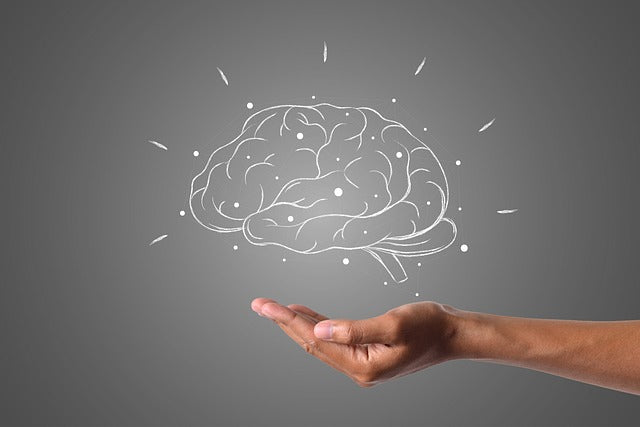
Informational purposes only, no product claims implied.
The King of Herbs Offers Robust Support for Better Mood and Cognition
Ginseng root has long been called the King of Herbs[i] and has been cultivated and used in China for many thousands of years.[ii] It is revered for its restorative properties, its ability to boost stamina and vigor, and its folk reputation as an aphrodisiac. Yet often overlooked is ginseng’s potent support for the mind and brain. The ancient Chinese pharmacopeia described ginseng as an herb able to “nourish all body organs, stabilize the soul, calm the nerves and spirit…maintain a cheerful mind, and enhance cognition and intelligence,” according to neurobiologist Mildred Yang and biochemist Mei Yi Wu.[iii]
Stabilize the soul and cheer the mind—no wonder the cognitive and mood-boosting aspects of ginseng are gaining renewed attention. There is an increasingly robust body of research showing just how and why ginseng can support brain function. It may the time has come to look again at its capacities.
The Secret Sauce? It’s Likely The Ginsenosides
There are two main varieties of ginseng: American ginseng, known as P. quinquefolius, and Asian ginseng, known as Panax ginseng. Panax means ‘all-healing’ or ‘panacea.’ Both species produce numerous phytochemicals that have been isolated and studied, including more than 30 different ginsenosides. These potent ginsenosides modulate many different pathways in the body and may result in a wide range of therapeutic actions.[iv]
It was not until the 1950’s that scientists began to isolate ginsenosides, molecules with a strong neuroprotective benefit.[v] In animal studies, ginsenosides have speeded up the acquisition of memories and have enhanced cognitive function.[vi] A ginsenoside called GRB1 has been demonstrated to protect and enhance memory and learning, perhaps in part by decreasing inflammatory molecules.[vii] GRB1 is neuroprotective[viii] and ginsenosides in general have been found to help modulate oxidative stress and neuroinflammation. Animal studies suggest that GRb1 may preserve the concentration of the neurotransmitter acetylcholine, which is known to aid in forming new memories.[ix] Animal studies also demonstrate that the herb increases feel-good neurotransmitters such as dopamine, norepinephrine and serotonin.[x]
Preserve The Precious Ability To Think
We all think, all the time. Even when asleep we are “thinking” while we dream.
But the quality of thinking can vary widely. Thinking includes the acquisition, organization and retrieval of information. This processing of information is the key to career success as well as making sound decisions in life. These processes can be aided by ginseng, according to studies.
One study on sixteen healthy male volunteers over a 3-month period found that those individuals taking 100 mg of a standard ginseng extract twice daily performed significantly better on an information processing task that required arithmetic.[xi] In another study, 400 mg of ginseng extract improved memory performance for up to six hours after a dose. Single doses of Panax ginseng were shown to both lower blood glucose levels and improve cognitive performance in healthy volunteers who had fasted overnight.[xii]
Other research has shown that ginseng extracts offer significant improvement in the speed of performing tasks that require memory, as well as the accuracy on tasks requiring attention.[xiii],[xiv] Ginseng significantly improved abstract thinking and reaction times in a study of 112 individuals over age 40. The participants took either a standardized ginseng extract or a placebo for up to nine weeks. Cognitive testing included everything from simple finger tapping to word recall to sorting cards with different shapes, and many other exercises.[xv]
American ginseng standardized to 10.65% ginsenosides significantly improved reaction time, accuracy and calmness.[xvi] A single dose of the extract also improved spatial working memory at three hours.[xvii] Another study looked at the effect of either 200 or 400 mg of Panax ginseng on 30 healthy adults before and after a 10-minute mental test. A 200 mg dose of ginseng improved mental performance and lessened fatigue during the test.
But perhaps most impressive was the study on thousands of Korean individuals who had been taking ginseng for a lifetime. Nearly 4000 elderly Koreans (average age of 70 years) completed initial evaluations and then two- and four-year follow-ups. Their ginseng use was categorized as either no use at all, low use (less than five years total) and high use (over five years total). The high use group showed significantly higher scores on cognitive testing.[xviii]
Supports the Stress Response
Under conditions of high demand our bodies adapt by releasing protective molecules, including the stress hormones cortisol and adrenaline. Adaptogenic botanicals are uniquely suited to helping increase resilience to stress, and ginseng has been shown to be one of the most effective.[xix] It is thought to support the body’s stress response by helping modulate the HPA axis (hypothalamic-pituitary-adrenal axis), our body’s central stress response system.[xx] Stress can activate the HPA axis and stimulate the release of hormones such as cortisol, noradrenaline and adrenaline.
One randomized, double-blind, six-week study followed 63 individuals aged 20 to 60 who were either nurses or firefighters—thus in high stress occupations associated with psychological distress. They received either a placebo or Korean red ginseng. All the study participants underwent a comprehensive psychological and physical evaluation ahead of the study. After six weeks, the Korean red ginseng group had lower levels of epinephrine. Because chronic stress can increase levels of neurotransmitters such as epinephrine, the researchers concluded that the participants’ fight-or-flight sympathetic nervous system response had stabilized. The participants taking ginseng also showed improved cognition.[xxi]
Support Cognition Through Blood Flow
Ginseng is well known for enhancing circulation and blood flow. This may account in part for its ability to support cognition. Animal studies have shown that Korean red ginseng, for instance, can enhance blood flow to the brain.[xxii] Similar effects have been shown in humans. Ginseng has, for instance, been shown to increase coronary flow reserve—a term used to describe the amount of additional blood flow that can be supplied to the heart above baseline.[xxiii] It supports arterial health as well.[xxiv]
In one randomized, double-blind study, forty individuals were given either 1500 mg of Korean red ginseng, or a placebo, for 8 weeks. Digital infrared thermal imagery showed that Korean red ginseng improved blood circulation in those taking it.[xxv]
Clearly, ginseng is a tonic for both body and brain. Ginseng has been shown to benefit mental function, calmness and mood. With all its benefits to the brain and mood, no wonder ginseng has been called the ‘elixir of life.’
You might also be interested in:
Stress Support 101: Gaba and Theanine: The Fast Acting Stress and Anxiety Antidote
Adrenal Fatigue: What It Really Means
In Our Golden Age of Athletic Super-Performance, Can You Gain an Edge




